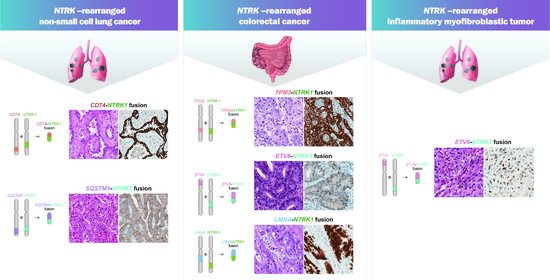Share and Cite
Bang, H.; Lee, M.-S.; Sung, M.; Choi, J.; An, S.; Kim, S.-H.; Lee, S.E.; Choi, Y.-L. NTRK Fusions in 1113 Solid Tumors in a Single Institution. Diagnostics 2022, 12, 1450. https://doi.org/10.3390/diagnostics12061450
Bang H, Lee M-S, Sung M, Choi J, An S, Kim S-H, Lee SE, Choi Y-L. NTRK Fusions in 1113 Solid Tumors in a Single Institution. Diagnostics. 2022; 12(6):1450. https://doi.org/10.3390/diagnostics12061450
Chicago/Turabian StyleBang, Heejin, Mi-Sook Lee, Minjung Sung, Juyoung Choi, Sungbin An, Seok-Hyung Kim, Seung Eun Lee, and Yoon-La Choi. 2022. "NTRK Fusions in 1113 Solid Tumors in a Single Institution" Diagnostics 12, no. 6: 1450. https://doi.org/10.3390/diagnostics12061450
APA StyleBang, H., Lee, M.-S., Sung, M., Choi, J., An, S., Kim, S.-H., Lee, S. E., & Choi, Y.-L. (2022). NTRK Fusions in 1113 Solid Tumors in a Single Institution. Diagnostics, 12(6), 1450. https://doi.org/10.3390/diagnostics12061450






